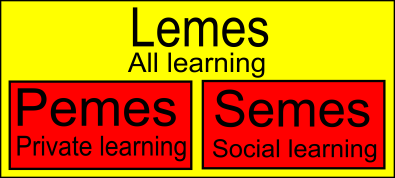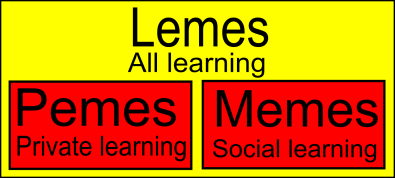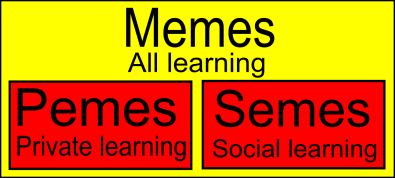What makes more sense scientifically is a unified theory of idea and memory evolution - which handles how ideas and memories evolve both within minds and between minds.
I go into this issue in previous posts:
In the context of the existing memetics paradigm, there are various ways of dealing with this:
- Enlarge the definition of a meme to include individual learning;
- Enlarge the definition of culture to include individual learning;
- Create new units to deal with all learned information.
- Do nothing - try and muddle through with the existing concepts.
This post looks at the possibility of creating new units to deal with learned information.
My proposal is "lemes" - an abbreviation for "learned genes". Here's a diagram showing three possible units:

Where do memes fit into this diagrem? In two possible ways. The first is conventional, the second is radical.
 New terminology: Lemes |
 Meme terminology promoted |
The problem with the term "leme" is that it seems relatively unlikely to get anywhere. Scientists might benefit from the three separate names for units of learned information - but most people are only going to bother with one term - and the term "meme" has pretty-much already won the battle for that role.
If "lemes" failed to take off, the problem would remain, and the solution would have been pretty ineffective.
I think the umbrella category that covers all learning is the most important, and that it should probably get the best term - which today appears to be "meme". So, I don't think the idea of "lemes" described on this page would be very practical to implement.
While we are entertaining the idea of expanding memetics to include all learning, perhaps we should consider the possibility of expanding it further - to include the evolution of the brain.
Not all evolutionary changes in the brain are to do with learning - there are also changes due to developmental processes, for example.
I think this type of expansion of the idea would probably be taking things too far, though.










No comments:
Post a Comment